Analyzing Natural Systems Approaches in Ontario University Education
VerifiedAdded on 2023/06/04
|6
|1182
|141
Essay
AI Summary
This essay delves into the informal culture prevalent in Ontario universities, analyzing its origins and effects on student engagement and academic outcomes. It highlights the challenges posed by disengaged student attitudes and the influence of external factors on the educational environment. The essay then explores the implications of progressivism in contemporary schools, contrasting traditional assessment methods with the principles of progressive learning. It emphasizes the importance of fostering intrinsic motivation, collaborative assessments, and holistic student development, advocating for changes that prioritize the human aspects of education alongside academic achievements. The paper also suggests utilizing natural systems mechanisms such as mentoring and moral boosting to improve student focus and engagement. The paper concludes by advocating for a shift towards educational values, promoting deep understanding and relational aspects of learning to enhance students' overall experience and success.
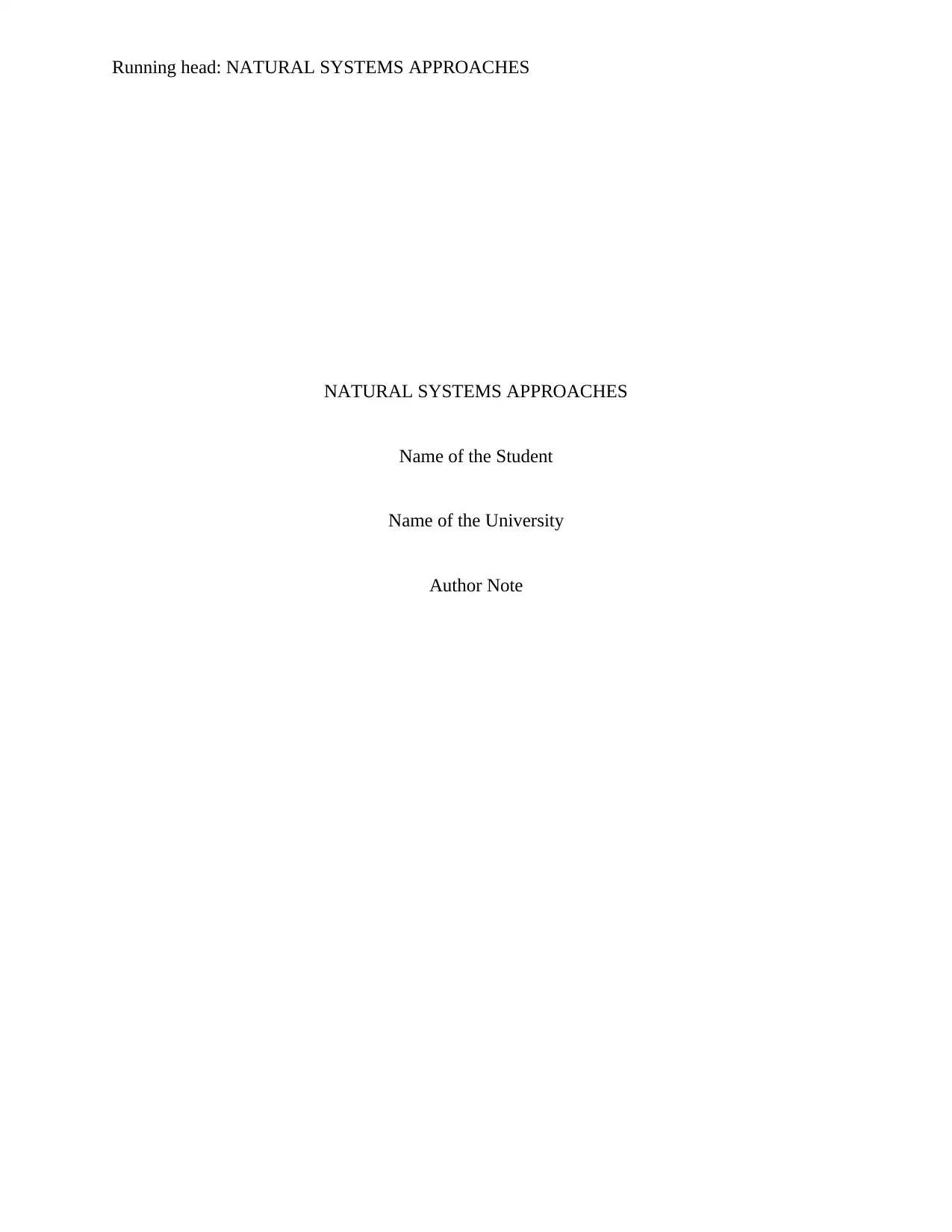
Running head: NATURAL SYSTEMS APPROACHES
NATURAL SYSTEMS APPROACHES
Name of the Student
Name of the University
Author Note
NATURAL SYSTEMS APPROACHES
Name of the Student
Name of the University
Author Note
Paraphrase This Document
Need a fresh take? Get an instant paraphrase of this document with our AI Paraphraser
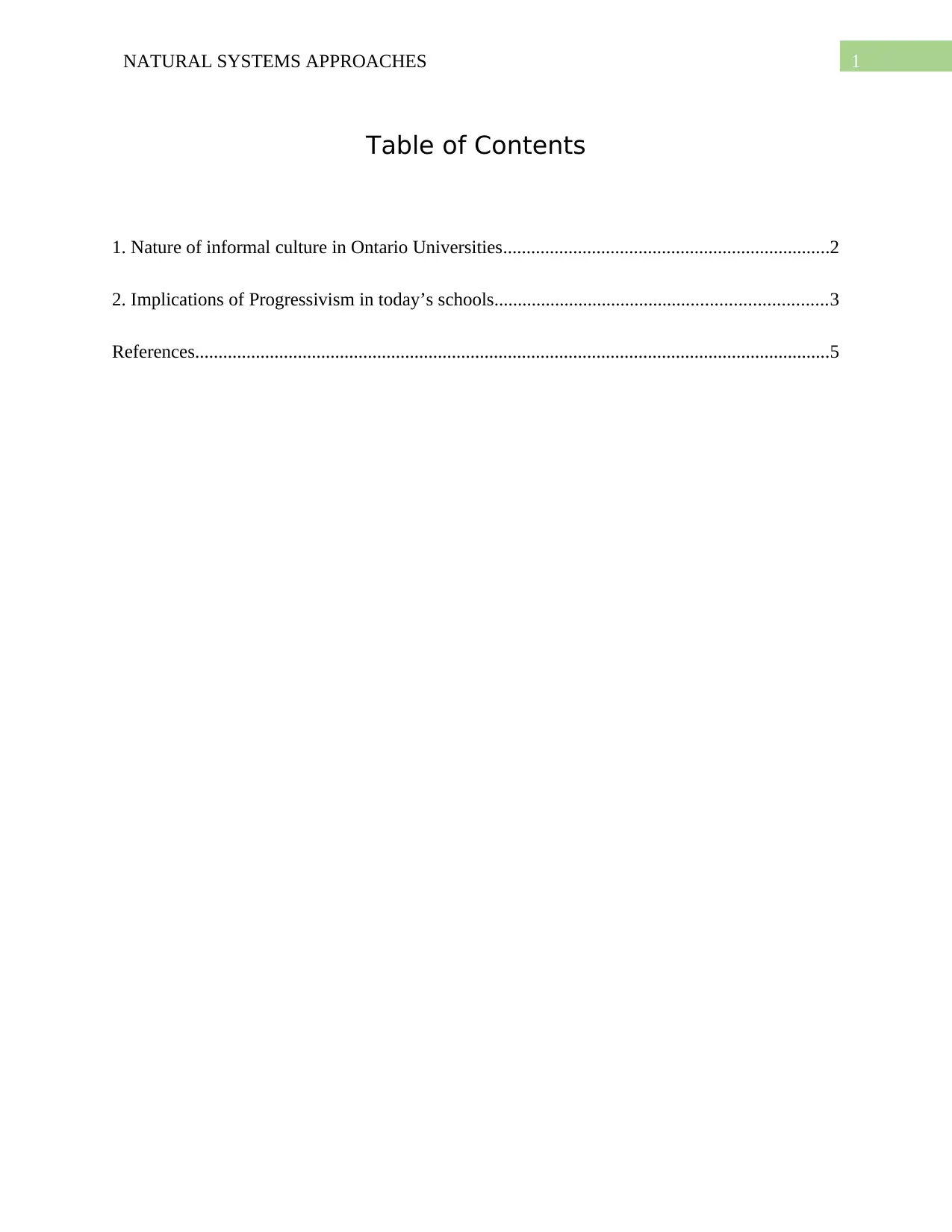
1NATURAL SYSTEMS APPROACHES
Table of Contents
1. Nature of informal culture in Ontario Universities......................................................................2
2. Implications of Progressivism in today’s schools.......................................................................3
References........................................................................................................................................5
Table of Contents
1. Nature of informal culture in Ontario Universities......................................................................2
2. Implications of Progressivism in today’s schools.......................................................................3
References........................................................................................................................................5
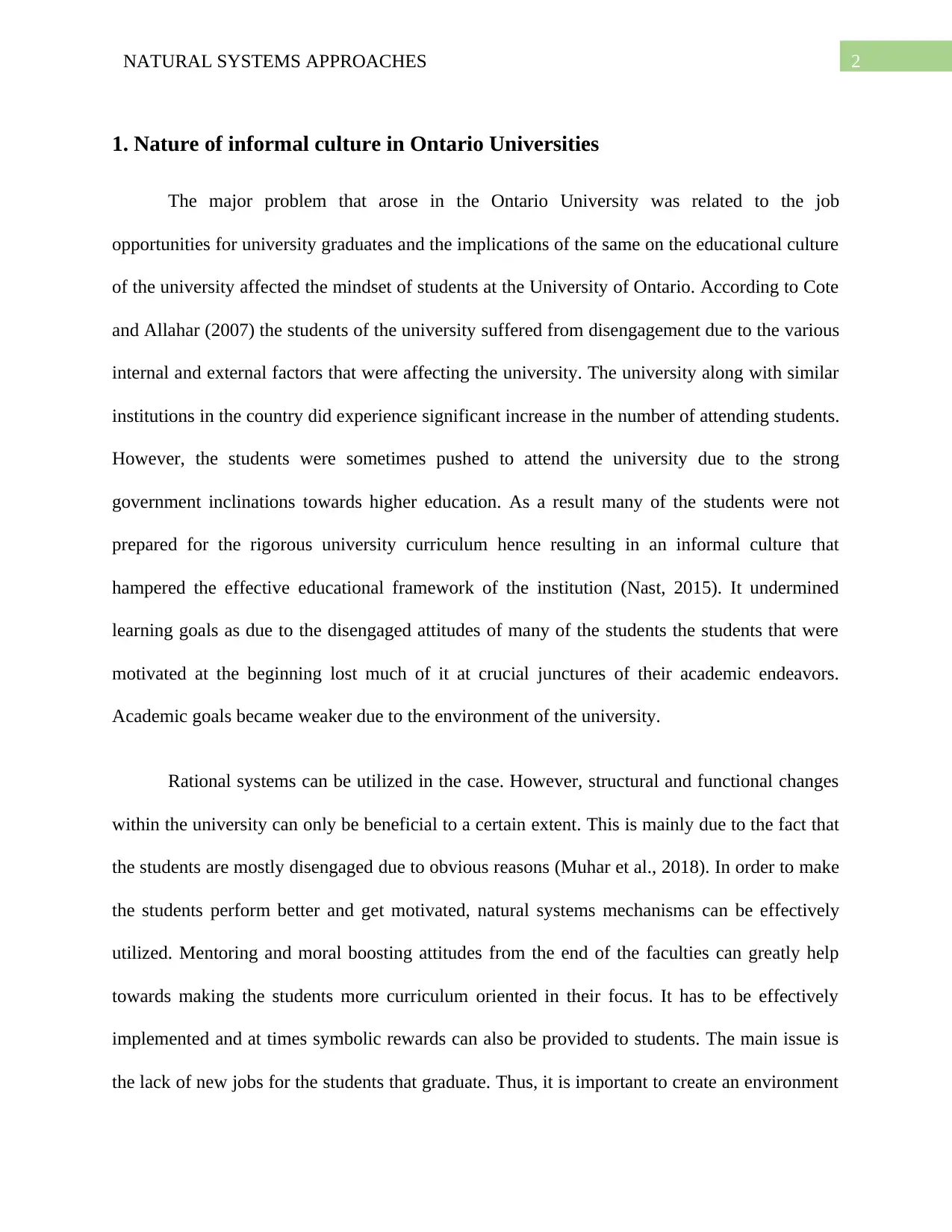
2NATURAL SYSTEMS APPROACHES
1. Nature of informal culture in Ontario Universities
The major problem that arose in the Ontario University was related to the job
opportunities for university graduates and the implications of the same on the educational culture
of the university affected the mindset of students at the University of Ontario. According to Cote
and Allahar (2007) the students of the university suffered from disengagement due to the various
internal and external factors that were affecting the university. The university along with similar
institutions in the country did experience significant increase in the number of attending students.
However, the students were sometimes pushed to attend the university due to the strong
government inclinations towards higher education. As a result many of the students were not
prepared for the rigorous university curriculum hence resulting in an informal culture that
hampered the effective educational framework of the institution (Nast, 2015). It undermined
learning goals as due to the disengaged attitudes of many of the students the students that were
motivated at the beginning lost much of it at crucial junctures of their academic endeavors.
Academic goals became weaker due to the environment of the university.
Rational systems can be utilized in the case. However, structural and functional changes
within the university can only be beneficial to a certain extent. This is mainly due to the fact that
the students are mostly disengaged due to obvious reasons (Muhar et al., 2018). In order to make
the students perform better and get motivated, natural systems mechanisms can be effectively
utilized. Mentoring and moral boosting attitudes from the end of the faculties can greatly help
towards making the students more curriculum oriented in their focus. It has to be effectively
implemented and at times symbolic rewards can also be provided to students. The main issue is
the lack of new jobs for the students that graduate. Thus, it is important to create an environment
1. Nature of informal culture in Ontario Universities
The major problem that arose in the Ontario University was related to the job
opportunities for university graduates and the implications of the same on the educational culture
of the university affected the mindset of students at the University of Ontario. According to Cote
and Allahar (2007) the students of the university suffered from disengagement due to the various
internal and external factors that were affecting the university. The university along with similar
institutions in the country did experience significant increase in the number of attending students.
However, the students were sometimes pushed to attend the university due to the strong
government inclinations towards higher education. As a result many of the students were not
prepared for the rigorous university curriculum hence resulting in an informal culture that
hampered the effective educational framework of the institution (Nast, 2015). It undermined
learning goals as due to the disengaged attitudes of many of the students the students that were
motivated at the beginning lost much of it at crucial junctures of their academic endeavors.
Academic goals became weaker due to the environment of the university.
Rational systems can be utilized in the case. However, structural and functional changes
within the university can only be beneficial to a certain extent. This is mainly due to the fact that
the students are mostly disengaged due to obvious reasons (Muhar et al., 2018). In order to make
the students perform better and get motivated, natural systems mechanisms can be effectively
utilized. Mentoring and moral boosting attitudes from the end of the faculties can greatly help
towards making the students more curriculum oriented in their focus. It has to be effectively
implemented and at times symbolic rewards can also be provided to students. The main issue is
the lack of new jobs for the students that graduate. Thus, it is important to create an environment
⊘ This is a preview!⊘
Do you want full access?
Subscribe today to unlock all pages.

Trusted by 1+ million students worldwide
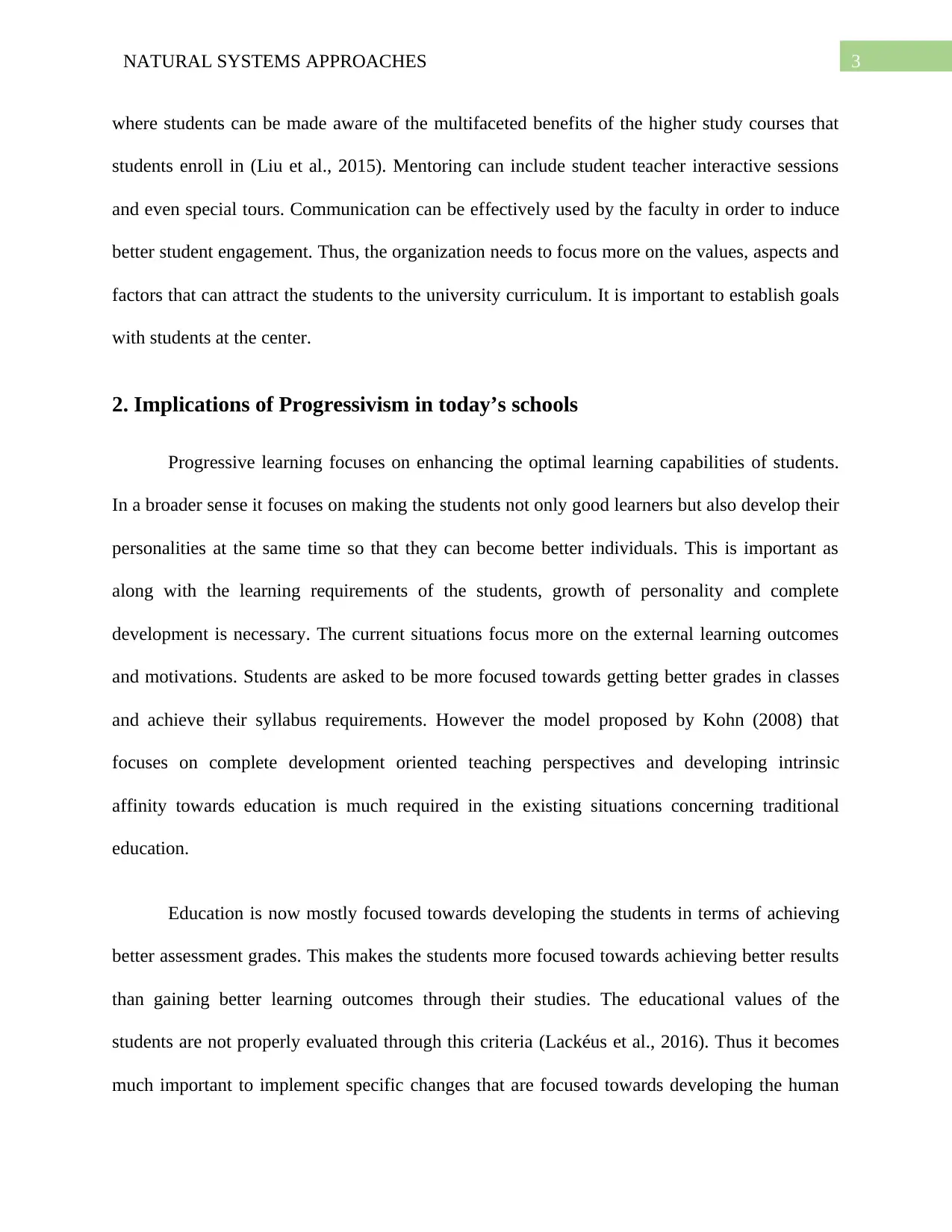
3NATURAL SYSTEMS APPROACHES
where students can be made aware of the multifaceted benefits of the higher study courses that
students enroll in (Liu et al., 2015). Mentoring can include student teacher interactive sessions
and even special tours. Communication can be effectively used by the faculty in order to induce
better student engagement. Thus, the organization needs to focus more on the values, aspects and
factors that can attract the students to the university curriculum. It is important to establish goals
with students at the center.
2. Implications of Progressivism in today’s schools
Progressive learning focuses on enhancing the optimal learning capabilities of students.
In a broader sense it focuses on making the students not only good learners but also develop their
personalities at the same time so that they can become better individuals. This is important as
along with the learning requirements of the students, growth of personality and complete
development is necessary. The current situations focus more on the external learning outcomes
and motivations. Students are asked to be more focused towards getting better grades in classes
and achieve their syllabus requirements. However the model proposed by Kohn (2008) that
focuses on complete development oriented teaching perspectives and developing intrinsic
affinity towards education is much required in the existing situations concerning traditional
education.
Education is now mostly focused towards developing the students in terms of achieving
better assessment grades. This makes the students more focused towards achieving better results
than gaining better learning outcomes through their studies. The educational values of the
students are not properly evaluated through this criteria (Lackéus et al., 2016). Thus it becomes
much important to implement specific changes that are focused towards developing the human
where students can be made aware of the multifaceted benefits of the higher study courses that
students enroll in (Liu et al., 2015). Mentoring can include student teacher interactive sessions
and even special tours. Communication can be effectively used by the faculty in order to induce
better student engagement. Thus, the organization needs to focus more on the values, aspects and
factors that can attract the students to the university curriculum. It is important to establish goals
with students at the center.
2. Implications of Progressivism in today’s schools
Progressive learning focuses on enhancing the optimal learning capabilities of students.
In a broader sense it focuses on making the students not only good learners but also develop their
personalities at the same time so that they can become better individuals. This is important as
along with the learning requirements of the students, growth of personality and complete
development is necessary. The current situations focus more on the external learning outcomes
and motivations. Students are asked to be more focused towards getting better grades in classes
and achieve their syllabus requirements. However the model proposed by Kohn (2008) that
focuses on complete development oriented teaching perspectives and developing intrinsic
affinity towards education is much required in the existing situations concerning traditional
education.
Education is now mostly focused towards developing the students in terms of achieving
better assessment grades. This makes the students more focused towards achieving better results
than gaining better learning outcomes through their studies. The educational values of the
students are not properly evaluated through this criteria (Lackéus et al., 2016). Thus it becomes
much important to implement specific changes that are focused towards developing the human
Paraphrase This Document
Need a fresh take? Get an instant paraphrase of this document with our AI Paraphraser
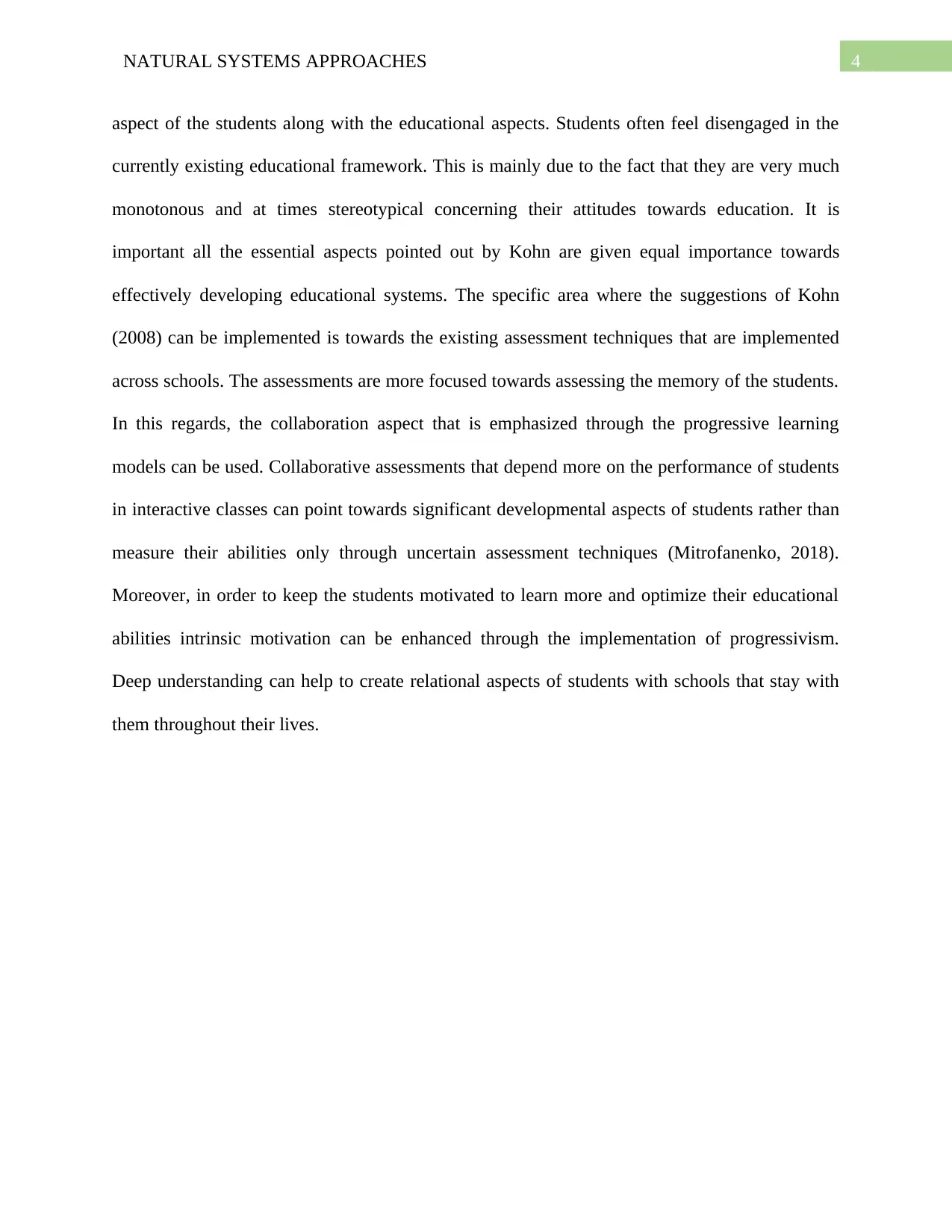
4NATURAL SYSTEMS APPROACHES
aspect of the students along with the educational aspects. Students often feel disengaged in the
currently existing educational framework. This is mainly due to the fact that they are very much
monotonous and at times stereotypical concerning their attitudes towards education. It is
important all the essential aspects pointed out by Kohn are given equal importance towards
effectively developing educational systems. The specific area where the suggestions of Kohn
(2008) can be implemented is towards the existing assessment techniques that are implemented
across schools. The assessments are more focused towards assessing the memory of the students.
In this regards, the collaboration aspect that is emphasized through the progressive learning
models can be used. Collaborative assessments that depend more on the performance of students
in interactive classes can point towards significant developmental aspects of students rather than
measure their abilities only through uncertain assessment techniques (Mitrofanenko, 2018).
Moreover, in order to keep the students motivated to learn more and optimize their educational
abilities intrinsic motivation can be enhanced through the implementation of progressivism.
Deep understanding can help to create relational aspects of students with schools that stay with
them throughout their lives.
aspect of the students along with the educational aspects. Students often feel disengaged in the
currently existing educational framework. This is mainly due to the fact that they are very much
monotonous and at times stereotypical concerning their attitudes towards education. It is
important all the essential aspects pointed out by Kohn are given equal importance towards
effectively developing educational systems. The specific area where the suggestions of Kohn
(2008) can be implemented is towards the existing assessment techniques that are implemented
across schools. The assessments are more focused towards assessing the memory of the students.
In this regards, the collaboration aspect that is emphasized through the progressive learning
models can be used. Collaborative assessments that depend more on the performance of students
in interactive classes can point towards significant developmental aspects of students rather than
measure their abilities only through uncertain assessment techniques (Mitrofanenko, 2018).
Moreover, in order to keep the students motivated to learn more and optimize their educational
abilities intrinsic motivation can be enhanced through the implementation of progressivism.
Deep understanding can help to create relational aspects of students with schools that stay with
them throughout their lives.
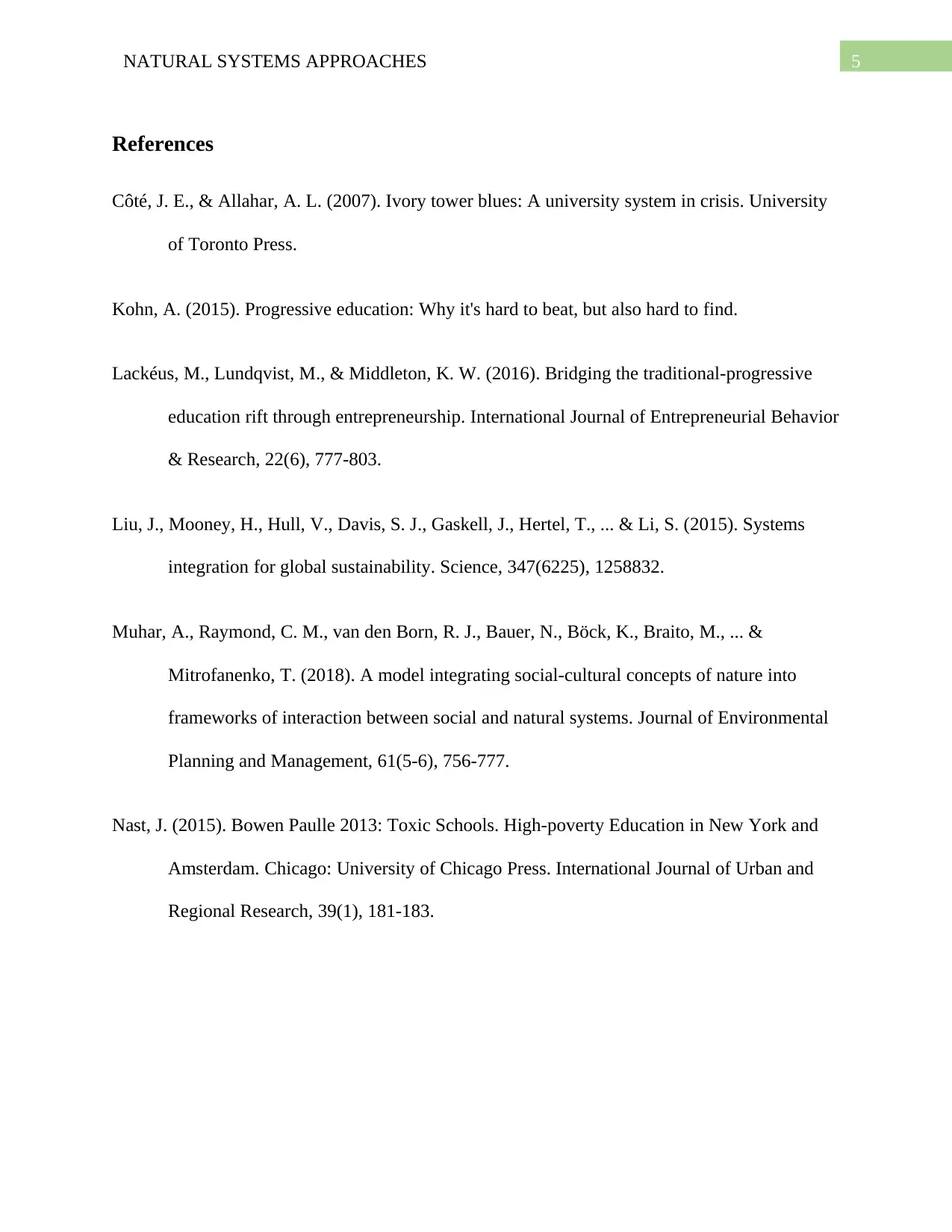
5NATURAL SYSTEMS APPROACHES
References
Côté, J. E., & Allahar, A. L. (2007). Ivory tower blues: A university system in crisis. University
of Toronto Press.
Kohn, A. (2015). Progressive education: Why it's hard to beat, but also hard to find.
Lackéus, M., Lundqvist, M., & Middleton, K. W. (2016). Bridging the traditional-progressive
education rift through entrepreneurship. International Journal of Entrepreneurial Behavior
& Research, 22(6), 777-803.
Liu, J., Mooney, H., Hull, V., Davis, S. J., Gaskell, J., Hertel, T., ... & Li, S. (2015). Systems
integration for global sustainability. Science, 347(6225), 1258832.
Muhar, A., Raymond, C. M., van den Born, R. J., Bauer, N., Böck, K., Braito, M., ... &
Mitrofanenko, T. (2018). A model integrating social-cultural concepts of nature into
frameworks of interaction between social and natural systems. Journal of Environmental
Planning and Management, 61(5-6), 756-777.
Nast, J. (2015). Bowen Paulle 2013: Toxic Schools. High‐poverty Education in New York and
Amsterdam. Chicago: University of Chicago Press. International Journal of Urban and
Regional Research, 39(1), 181-183.
References
Côté, J. E., & Allahar, A. L. (2007). Ivory tower blues: A university system in crisis. University
of Toronto Press.
Kohn, A. (2015). Progressive education: Why it's hard to beat, but also hard to find.
Lackéus, M., Lundqvist, M., & Middleton, K. W. (2016). Bridging the traditional-progressive
education rift through entrepreneurship. International Journal of Entrepreneurial Behavior
& Research, 22(6), 777-803.
Liu, J., Mooney, H., Hull, V., Davis, S. J., Gaskell, J., Hertel, T., ... & Li, S. (2015). Systems
integration for global sustainability. Science, 347(6225), 1258832.
Muhar, A., Raymond, C. M., van den Born, R. J., Bauer, N., Böck, K., Braito, M., ... &
Mitrofanenko, T. (2018). A model integrating social-cultural concepts of nature into
frameworks of interaction between social and natural systems. Journal of Environmental
Planning and Management, 61(5-6), 756-777.
Nast, J. (2015). Bowen Paulle 2013: Toxic Schools. High‐poverty Education in New York and
Amsterdam. Chicago: University of Chicago Press. International Journal of Urban and
Regional Research, 39(1), 181-183.
⊘ This is a preview!⊘
Do you want full access?
Subscribe today to unlock all pages.

Trusted by 1+ million students worldwide
1 out of 6
Related Documents
Your All-in-One AI-Powered Toolkit for Academic Success.
+13062052269
info@desklib.com
Available 24*7 on WhatsApp / Email
![[object Object]](/_next/static/media/star-bottom.7253800d.svg)
Unlock your academic potential
Copyright © 2020–2025 A2Z Services. All Rights Reserved. Developed and managed by ZUCOL.





